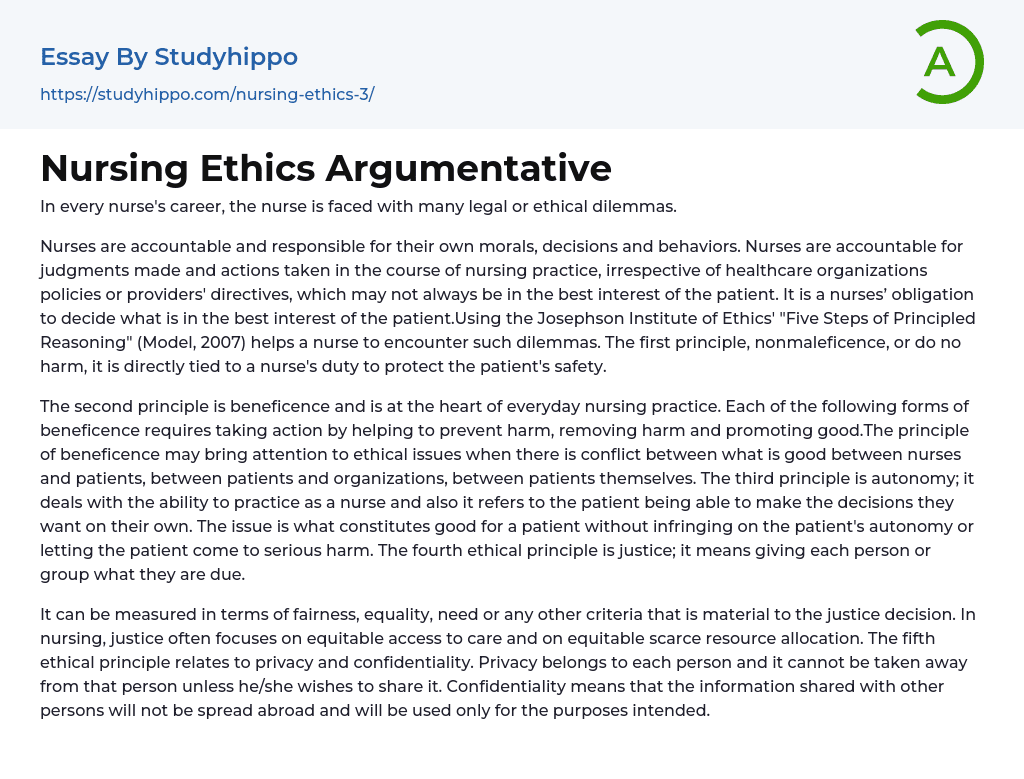In every nurse's career, the nurse is faced with many legal or ethical dilemmas.
Nurses are accountable and responsible for their own morals, decisions and behaviors. Nurses are accountable for judgments made and actions taken in the course of nursing practice, irrespective of healthcare organizations policies or providers' directives, which may not always be in the best interest of the patient. It is a nurses’ obligation to decide what is in the best interest of the patient.Using the Josephson Institute of Ethics' "Five Steps of Principled Reasoning" (Model, 2007) helps a nurse to encounter such dilemmas. The first principle, nonmaleficence, or do no harm, it is directly tied to a nurse's duty to protect the patient's safety.
The second principle is beneficence and is at the heart of everyday nursing practice. Each of the following
...forms of beneficence requires taking action by helping to prevent harm, removing harm and promoting good.The principle of beneficence may bring attention to ethical issues when there is conflict between what is good between nurses and patients, between patients and organizations, between patients themselves. The third principle is autonomy; it deals with the ability to practice as a nurse and also it refers to the patient being able to make the decisions they want on their own. The issue is what constitutes good for a patient without infringing on the patient's autonomy or letting the patient come to serious harm. The fourth ethical principle is justice; it means giving each person or group what they are due.
It can be measured in terms of fairness, equality, need or any other criteria that is material to the justice decision. In nursing, justice
often focuses on equitable access to care and on equitable scarce resource allocation. The fifth ethical principle relates to privacy and confidentiality. Privacy belongs to each person and it cannot be taken away from that person unless he/she wishes to share it. Confidentiality means that the information shared with other persons will not be spread abroad and will be used only for the purposes intended.
- Values of Life essays
- Ethical dilemma essays
- Normative Ethics essays
- Virtue Ethics essays
- Belief essays
- Deontology essays
- Moral essays
- Virtue essays
- Work Ethic essays
- Jurisprudence essays
- Social Injustice essays
- Juvenile Justice essays
- Psychometrics essays
- Measure essays
- Why I Want to Be a Nurse essays
- Nursing Profession essays
- Why Did You Choose Nursing essays
- Acceptance essays
- Age Of Enlightenment essays
- Child Observation essays
- Confucianism essays
- Conscience essays
- Critical Reflection essays
- Destiny essays
- Determinism essays
- Empiricism essays
- Environmentalism essays
- Epistemology essays
- Ethics essays
- Ethos essays
- Existence essays
- Existentialism essays
- Fate essays
- Free Will essays
- Functionalism essays
- Future essays
- Good And Evil essays
- Human Nature essays
- Individualism essays
- Meaning Of Life essays
- Metaphysics essays
- Natural Law essays
- Personal Philosophy essays
- Philosophers essays
- Philosophy Of Life essays
- Political Philosophy essays
- Pragmatism essays
- Reality essays
- Relativism essays
- Teaching Philosophy essays




